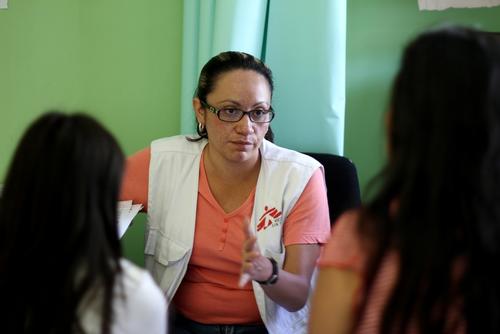Survivors of sexual violence can face long-term physical and mental health consequences.
Theme: Family & sexual violence
Sexual violence is a global problem. On average, one in three women will experience some form of sexual violence or intimate partner violence during her lifetime. Under-recognised is the fact that it is also a medical emergency, with potentially long-term consequences of physical and mental health. Young women are also at greater risk of rape than older women according to the World Health Organization, a fact all too evident in Médecins Sans Frontières’ sexual and gender-based violence projects in the capitals of Kenya and Honduras where the majority of patients are under 18.[1]
Barbara Salano is the Clinical Officer in Médecins Sans Frontières’ Nairobi clinic. “Adolescence is a critical stage in anyone’s life cycle: the transition from childhood to adulthood. There are many hormonal changes, and the girls become a target. People want to take advantage of them, luring them into early sex. At times they are given money—because they come from a poor community, they are vulnerable,” she says.
The situation is often compounded by a lack of sex education, and knowledge about reproductive health. Girls will not know they have a right to say ‘no’. But the factors leading to sexual violence can run deep.
In the densely-packed Nairobi slum of Mathare, poverty and violence are endemic. Single parent families and orphans are not uncommon, leaving many children unsupervised. The perpetrator may be a household member, or a partner, or a group of men, often brought into the girl’s orbit by someone she knows.
In Tegucigalpa, Honduras, as in Mathare, adolescence is often the stage when long-term abuse is exposed.
Diana Castillo, a medical doctor working with Médecins Sans Frontières’ ”priority service” says, "I have an 11 year-old patient who never saw her first period because she got pregnant before her first menstruation, to her father who had been abusing her since she was five years old. I see many patients who have been sexually abused and are pregnant as a result of the assault."
Once an attack has occurred, lack of awareness about the need for medical care and what is available, lack of social support, fear and shame can hinder a younger woman’s access to appropriate care. She may also be denied services due to her age.
In Kenya and Honduras, along with other countries, Médecins Sans Frontières engages at a grass roots level to raise awareness about sexual and gender-based violence, and the availability of adequate care. At the same time, the organisation continues to lobby for integrated policy and comprehensive services to overcome the many barriers still faced by survivors today.
Those services need to comprise, as a first priority, confidential psychosocial support and emergency medical care. Psychosocial support is imperative from the first moment of contact, with follow-up as the survivor is led through the sadness, anger, anxiety or any other reaction to the trauma. Emergency medical care needs to be started within 72 hours after the assault, to give prophylaxis for HIV, antibiotics for infections, and emergency contraception to prevent unwanted pregnancies. Injuries will also require medical treatment.
This combination can help survivors recover and start the process of reducing long-term effects. But legal, protective, and social services must be combined for a truly effective response. In Mathare, for example, the service offers temporary shelter, food and clothing, and referrals to organisations providing longer-term protection, although their capacity is limited. If legal proceedings are instigated, Médecins Sans Frontières provides a medical certificate, forensic evidence and expert testimony for the hearing.
Sixteen-year-old Maureen was raped during a Christmas visit to Nairobi. After lodging a police complaint, she spoke about that time. “I was very down and my spirit was low, I felt I could not move on,” she says. “I came to the Médecins Sans Frontières’ clinic. I was counselled and treated. Now I have very high expectations about life, I love myself and I just pray I am able to move on and [one day] become a judge. You know people can discourage me that I will not make it, but I am determined to make it. I would like people to learn that nothing is impossible.”




